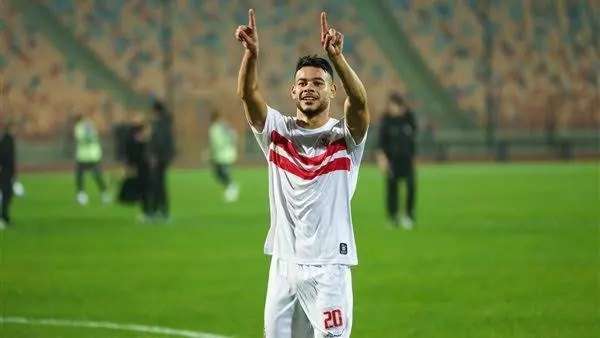When the Whistle Meets the Court: Zamalek Fights Donga Suspension in the Egyptian Super Cup
27 October 2025

Legal pushback over Donga suspension
Zamalek’s legal adviser, Mohamed Metwally, stated that the club will take every legal measure available regarding the suspension of midfielder Nabil Emad, known as Donga, in the Egyptian Super Cup.
During a radio interview, Metwally said the Egyptian Football Association had not sent any letters to Zamalek about suspending Donga after the previous Super Cup, before the current season began.
He added that retroactive punishment is not permissible, and that the federation’s new regulations prevent Donga from being banned from the Super Cup, underscoring a belief that the law does not permit such retroactive action.
Metwally argued that it is neither logical nor legally viable to impose a four-match ban to be served solely in the Super Cup, a one-off game, since that would effectively translate into a ban spanning years rather than four matches. He emphasized that any suspension should be served in the nearest official domestic matches, in line with the local competitions under the federation’s umbrella.
In a formal section labeled an urgent decision, the competition’s administration had previously sent letters to the four clubs participating in the Super Cup in the UAE—Al Ahly, Zamalek, Pyramids, and Ceramica Cleopatra—informing them of players under suspension for the upcoming clash.
The suspension list singled out Donga, citing four matches in the Super Cup based on the match referee’s report from the last edition held in the UAE.
Conflicting voices and potential implications
Hani Abu Rida, president of the Egyptian Football Association, remarked that sanctions against the Zamalek trio would stand and that Donga would not participate in the Super Cup. He noted that the earlier federation had informed the club’s administration via email, but stressed that the formal sanction had been issued and would finalize the matter.
Abu Rida also highlighted a separate issue affecting the national team’s second squad: several players from Pyramids face two league fixtures with their club in early December, complicating preparations for the Arab Cup.
He said he spoke with Ahmed Diab, head of the Professional Clubs Association, to postpone those league games to ensure all players could join the national team duties. Abu Rida stressed that the federation leads national-team results and must resolve issues facing the technical staff.
He dismissed proposals not to participate in the Arab Cup, insisting the country cannot skip the tournament even if it requires assembling a strong squad, a point he credited to coach Hossam Hassan (Dreams of a strong calisthenics of preparation). He stressed that the federation is responsible for national-team performance and would address ongoing problems accordingly.
Regarding the World Cup 2026 reward storyline, Abu Rida noted that while the sports ministry proposed a bonus according to its roster rules, he preferred directing rewards toward champion athletes in other games, leaving national-team bonuses under the federation’s remit.
He concluded by saying there were no clashes with the ministry and that discussions with leadership continued in a constructive, official manner.
Rifts and revelations from the old guard
Eihab Al-Koumi, a former member of the federation’s board, stated that the referee’s report from the Zamalek vs. Pyramids Super Cup last edition implicated three individuals: the club’s former football director Abdul Wahid Al-Sayed, Donga, and Mustafa Shalaby (now with Bank Al Ahly). He claimed the sanction was officially archived during his tenure and that Donga’s travel to the UAE should not be hindered by an unresolved line of communication.
Al-Koumi added that the letter implementing Donga’s ban was sent to Zamalek, and that the current federation had been aware of it; he emphasized that the current administration had confirmed the sanction’s existence to the club in correspondence.
Mohamed Abu Al-Wafa, another former federation official, argued that Donga should be eligible to participate in the next edition of the Super Cup in the UAE, and he disputed suggesting that Abdul Wahid Al-Sayed or Shalaby faced suspensions at that time. He also noted that the current federation’s letters about the punishment had reached the club.
Abu Al-Wafa maintained that errors and contradictions should be examined in a formal review, adding that participating in the Arab Cup remains a priority for national duties.
Contradictions!
In closing, the former officials pointed to disagreements within the federation and suggested that the matter may require further clarification in formal channels to prevent ongoing confusion about Donga’s status.
Implications for the Super Cup and the national team
The Super Cup pressure-cooker scenario highlights the delicate balance between federation regulations, club rights, and national-team commitments. With UAE-hosted matches on the calendar, clubs are keen to protect their players while the federation navigates governance and retroactivity concerns. The saga may ripple into scheduling, player availability, and the broader relationship between Egyptian clubs and the national team planning teams.
Ultimately, the lighter side of this heavy talk: a season where contract clauses duel with match bans, and lawyers draft more lines than a football formation. The pitch may be quiet, but the courtroom could be buzzing.
Punchline 1: If laws were as quick as a striker’s finish, this whole saga would be settled by halftime. Punchline 2: And if match officials had a referee cam for every argument, we'd finally get a fair replay of this drama with popcorn optional but encouraged.



